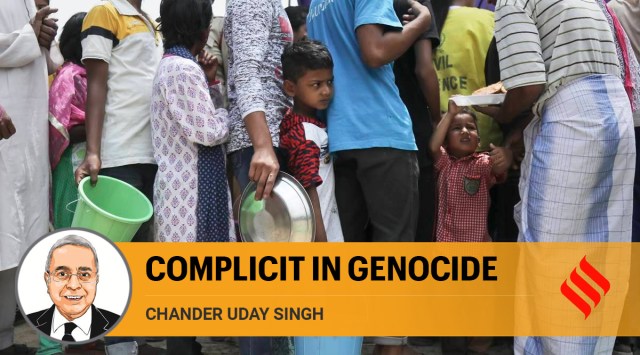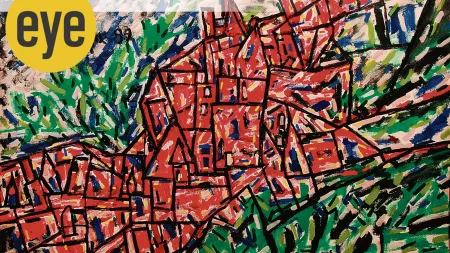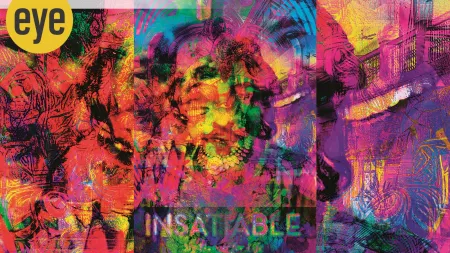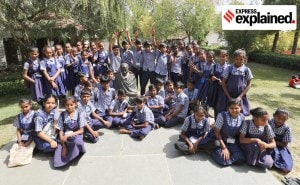- India
- International
Supreme Court must rethink its order on deportation of Rohingya refugees
The April 8 order is disappointing not just for the callous disregard of grave human rights issues by a Court which was a beacon for other constitutional courts; it is startling for its refusal to examine the questions raised by the petitioners, and to probe even superficially the facile defences of the government.
 Rohingya refugees waiting for food in queue.(Express Photo by Abhinav Saha/File)
Rohingya refugees waiting for food in queue.(Express Photo by Abhinav Saha/File)Supreme Court judgments are sometimes hailed for their sagacious blend of head and heart; other times, a judge with a towering intellect gets away with perceived heartlessness by the irrefutable strength of reason; or another who is all heart, makes up in compassion what may be lacking in cold logic.
But what is inexcusable, and especially in a human rights case involving the lives and personal liberty of hundreds of unlawfully detained refugees threatened with deportation into the hands of a genocidal regime, is a conscious refusal by the Court to consider the facts, to examine uncontested materials placed before it, and to hold the central and state governments to their duties under Part III of the Constitution of India, as well as their obligations under binding international law. If the government of the day exposes the nation to the danger of being complicit in genocide, the least that is expected of the Supreme Court is to hear, consider, examine, evaluate and decide. Burying one’s head in the sand, and turning a stony heart away from searing issues, does credit neither to head nor heart.
In its April 8 order in Mohammad Salimullah v. Union of India, the Supreme Court rejected an application to stay the deportation of Rohingya refugees to Myanmar. The Court noted the petitioners’ contention that more than 6,500 Rohingya refugees were illegally detained in Jammu, and that 150-170 of them were under imminent threat of forcible deportation at a time when the civilian government of Myanmar stood unseated by a military coup. It also noted the petitioners’ reliance on a judgment of the International Court of Justice (ICJ) dated January 23, 2020, which recorded the genocidal conditions that resulted in 7.75 lakh Rohingyas being forced to take refuge in Bangladesh and India. Ultimately however, relying on the bald and unsubstantiated word of the government that the principle of non-refoulement, or forcible repatriation to a place where the refugee’s life is in danger, applies only to signatories to the UN’s Refugee Convention of 1951 or its 1967 Protocol, and that a previous application for seven Rohingya refugees in Assam had been dismissed on October 4, 2018, the Court rejected the present application. In the interest of full disclosure, it must be stated that a UN Special Rapporteur represented by the present author was not heard, as the Court felt that serious objections had been raised to her intervention.
The April 8 order is disappointing not just for the callous disregard of grave human rights issues by a Court which was a beacon for other constitutional courts; it is startling for its refusal to examine the questions raised by the petitioners, and to probe even superficially the facile defences of the government.
A glance at the ICJ judgment reveals that the United Nations, by General Assembly resolution 73/264 adopted on December 22, 2018, had accepted two reports of the independent international fact-finding mission on Myanmar, which clearly established that the Rohingyas had been systematically disenfranchised, rendered stateless, subjected to widespread atrocities, uprooted from hundreds of villages which were burnt to the ground, and subjected to mass killings, disappearances, rape and plunder. Para 71 of the ICJ judgment noted the detailed findings of another independent international fact-finding mission on Myanmar dated September 16, 2019. And in the passages that follow, the ICJ records another United Nations General Assembly resolution (74/246), adopted on December 27, 2019:

“71. The Court notes that…… since October 2016, the Rohingya in Myanmar have been subjected to acts which are capable of affecting their right of existence as a protected group under the Genocide Convention, such as mass killings, widespread rape and other forms of sexual violence, as well as beatings, the destruction of villages and homes, denial of access to food, shelter and other essentials of life. As indicated in resolution 74/246 adopted by the General Assembly on 27 December, 2019, this has caused almost 744,000 Rohingya to flee their homes and take refuge in neighbouring Bangladesh.”
“72. The Court is of the opinion that the Rohingya in Myanmar remain extremely vulnerable. In this respect, the Court notes that in its resolution 74/246 of 27 December 2019, the General Assembly reiterated ‘its grave concern that, in spite of the fact that Rohingya Muslims lived in Myanmar for generations prior to the independence of Myanmar, they were made stateless by the enactment of the 1982 Citizenship Law and were eventually disenfranchised, in 2015, from the electoral process’.
“73. …..Moreover, the Court cannot ignore that the General Assembly has, as recently as on 27 December 2019, expressed its regret that ‘the situation has not improved in Rakhine State to create conditions necessary for refugees and other forcibly displaced persons to return to their places of origin voluntarily, safely and with dignity’. …At the same time the General Assembly reiterated ‘its deep distress at reports that unarmed individuals in Rakhine State have been and continue to be subjected to the excessive use of force and violations of human rights and international humanitarian law by the military and security and armed forces, including extrajudicial, summary or arbitrary killings, systematic rape and other forms of sexual and gender-based violence, arbitrary detention, enforced disappearance and government seizure of Rohingya lands from which Rohingya Muslims were evicted and their homes destroyed’.
“74. Finally, the Court observes that, irrespective of the situation that the Myanmar Government is facing in Rakhine State, including the fact that there may be an ongoing internal conflict between armed groups and the Myanmar military and that security measures are in place, Myanmar remains under the obligations incumbent upon it as a State party to the Genocide Convention. The Court recalls that, in accordance with the terms of Article I of the Convention, States parties expressly confirmed their willingness to consider genocide as a crime under international law which they must prevent and punish independently of the context ‘of peace’ or ‘of war’ in which it takes place…”
Based on these preliminary findings, the ICJ on 23.01.2020 issued a slew of provisional measures to prevent continued genocide of the Rohingyas. Importantly, in the context of the Petitioner’s submission that forced repatriation or deportation is particularly fraught after the recent military coup, the ICJ directed that:
“80. Myanmar must also, in relation to the members of the Rohingya group in its territory, ensure that its military, as well as any irregular armed units which may be directed or supported by it and any organization and persons which may be subject to its control, direction or influence, do not commit acts of genocide, or of conspiracy to commit genocide, of direct and public incitement to commit genocide, or of complicity in genocide.”
“81. The Court is also of the view that Myanmar must take effective measures to prevent the destruction and ensure the preservation of any evidence related to allegations of acts within the scope of Article II of the Genocide Convention.”
The Supreme Court accepted the central government’s glib assertion that non-refoulement applies only to contracting states under the refugee convention, and that the right not to be deported flows not from the right to life and liberty under Article 21, which applies to all human beings, but from the right to reside and settle in India under Article 19(1)(g), which applies to citizens alone. Had the Court opened its eyes to the materials staring it in the face, these specious arguments would have been laid bare.
India is a signatory to the Convention for the Prevention and Punishment of the Crime of Genocide (the Genocide Convention, 1948), and on March 2, 2016, Kiren Rijiju, Minister of State for Home Affairs, informed the Rajya Sabha that by acceding to the Convention in 1959, India has recognised genocide as an international crime, and that the principles of the Convention are “therefore already part of common law of India”. India has also ratified the International Convention on the Elimination of All Forms of Racial Discrimination (ICERD), the International Covenant on Civil and Political Rights (ICCPR) and a number of other UN conventions which also have a bearing on non-refoulement, particularly those dealing with the rights of women (CEDAW) and children (CRC), both of which have been declared by the Supreme Court to be part of our domestic legal framework.
Without labouring the issue, Article 6(1) of the ICCPR, which mirrors Article 21 of our Constitution, declares that “Every human being has the inherent right to life. This right shall be protected by law. No one shall be arbitrarily deprived of his life”. Article 6(3) of this Convention mandates that “When deprivation of life constitutes the crime of genocide, it is understood that nothing in this article shall authorise any State Party to the present Covenant to derogate in any way from any obligation assumed under the provisions of the Convention on the Prevention and Punishment of the Crime of Genocide”.
The leitmotif of the Genocide Convention is “prevention”, and that word is not only prominent in its title, but central to Article I, under which the contracting parties confirm that genocide is a crime under international law, “which they undertake to prevent and to punish”. One of the acts punishable as an international crime in Article III(e), is “complicity in genocide”.
Any remaining doubts about the status of non-refoulement under international law, are dispelled by the general recommendations of the United Nations’ Human Rights Council (UNHRC) adopted by the Committee on the Elimination of Racial Discrimination, under the ICERD, which India is a party to. Section VI of general recommendation XXX adopted at the 65th session (2005), titled “Expulsion and Deportation of Non-Citizens”, contains clauses 25 to 28, the first three of which are relevant to the proposed expulsion or deportation of Rohingyas. Suffice, however, to set out clause 27, which requires that state parties “ensure that non-citizens are not returned or removed to a country or territory where they are at risk of being subject to serious human rights abuses, including torture and cruel, inhuman or degrading treatment or punishment”.
Equally, it is increasingly accepted in public international law, that non-refoulement and other protections emanating from the Genocide Convention, are peremptory norms that apply to state parties as well as non-parties, or in other words, that non-refoulement is jus cogens, a norm from which there can be no derogation whatsoever. Indeed, at least three high courts (Gujarat in 1998, Delhi in 2015, and Calcutta in 2019) have held that non-refoulement is part of the right to life and liberty protected by Article 21 of our Constitution.
Sadly, the Supreme Court accepted the unsubstantiated word of the government, which flew in the face of all the clinching materials that were on record. Worse, the Court relied on an earlier, one-paragraph, order dated October 4, 2018, dismissing an application to prevent deportation of seven Rohingyas from Assam. Resultantly, the Court brushed aside major developments after October 4, 2018, including the UN General Assembly resolutions of December 2018 and December 2019, the UNHCR Special Rapporteur’s application of July 2019, the ICJ judgment dated January 23, 2020, and the military coup of February 1, 2021, which unseated the elected civilian government and jailed the Prime Minister and President. This last event is met with the statement that the Supreme Court “cannot comment upon something happening in another country’; a statement that is bewildering, considering that deportation, genocide, treaty obligations, and non-refoulement are inextricably concerned with the state of affairs in Myanmar. This is a callous cop-out, in view of the General Assembly resolutions recording that Myanmar’s military was involved in a text-book case of ethnic cleansing and genocide. In fact, the junta that now rules Myanmar is headed by the Commander-in-Chief of the Tatmadaw, Senior General Min Aung Hlaing, who, along with other generals under his command, was named as the principal perpetrator of the genocidal “clearance operations” against Rohingyas in 2016 and 2017. Indeed, directions 2 and 3 of the ICJ’s provisional measures are mandates against the military, which makes the Supreme Court’s comment even more incomprehensible.
So what should the Supreme Court do?
There are two possible solutions. The first is that in its interim order, the Court specifies that the Rohingya refugees may not be deported unless “the procedure prescribed for such deportation is followed”. It is a long-held principle of Indian jurisprudence that the word “procedure” means “due process”, or a procedure that is just, fair, and reasonable. The Supreme Court can, thus, suo motu clarify that its interim order means that the refugees may not be deported without due process, and due process requires that they not be deported as long as there exists a reasonable threat of persecution in Myanmar.
Alternately, since the order in question is an interim order that was passed without a detailed hearing, the damage is not irreversible. The Court could, therefore, swiftly hear the main petition on its merits, and clarify the law on non-refoulement and Article 21. By doing this, the Court will redeem its hard-earned reputation of being the “last refuge of the oppressed and the bewildered”.
This article first appeared in the print edition on April 26, 2021, under the title “Complicit in genocide”. The writer is a senior advocate in the Supreme Court.
40 Years Ago
EXPRESS OPINION
More Explained
Apr 23: Latest News
- 01
- 02
- 03
- 04
- 05









































